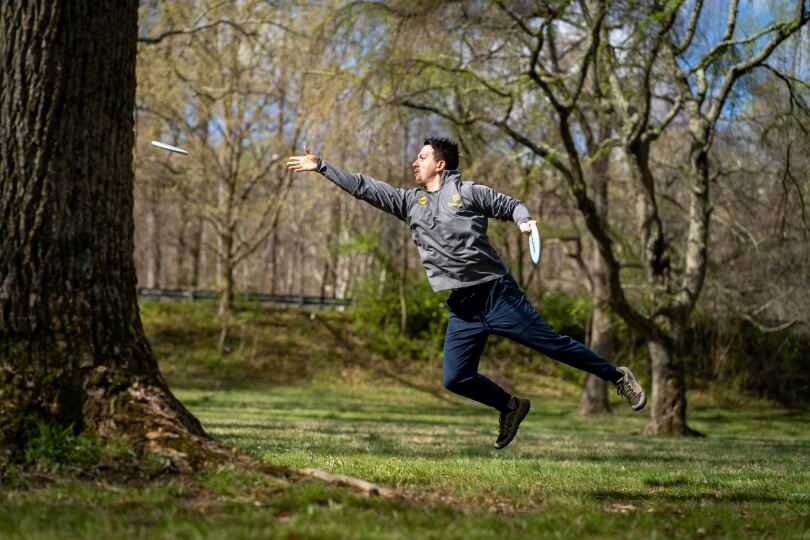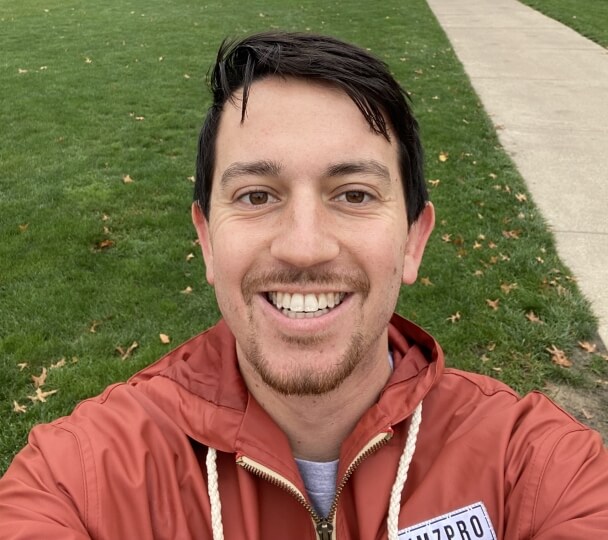Anthony Rentsch, S.M. '19, started playing disc golf during the pandemic, and it turned into a career for the former Harvard data science graduate student.
Like so many of us, Anthony Rentsch got tired of being cooped up in his house during the pandemic. He wanted to socialize again, but needed a way to do it safely, preferably outdoors.
That’s when Rentsch turned to disc golf. The sport, in which players try to traverse the length of each hole and hit the basket or chains hanging above it in as few throws as possible, gave Rentsch everything he was looking for, and it wasn’t long before he became hooked.
“It was a sport that was outside, socially distant, a perfect way to get out of the house and be away from people and still be active,” Rentsch. “Disc golf has been booming, and I’m a product of that boom.”
Rentsch’s discovery came at a time in his life when he was evaluating a potential career change. He’d mostly worked for non-profit organizations since getting his S.M. in data science from the Harvard John A. Paulson School of Engineering in Applied Sciences (SEAS) in 2019, but by 2021 was looking to do something else with his education.
A job opened up at UDisc, a popular disc golf app and website app, at the end of 2021. Rentsch applied for the position, and he’s now entering his second year as a full-time data scientist at the company.
“Before I started working at UDisc, I spent most of my free time thinking about and playing disc golf anyway,” Rentsch said. “It was just a really huge hobby for me. And so now to get to think about that all the time, and have access to more data and other people who are as interested in disc golf as I am, is a really fun and cool experience.”
At UDisc, Rentsch is responsible for turning the company's vast quantity of data into insightful reports and tools. His company tracks course information such as the number of players at any given time or how hard or easy a specific hole is, and also world rankings, wind probabilities and live scorekeeping for Disc Golf Pro Tour tournaments. UDisc also uses yearly reports to track the overall growth of the sport, which has seen increases in the number of courses worldwide, new courses being built per day, and total number of rounds scored on the app.
“A big thing for us is providing data for other people to use to continue growing the sport,” he said. “Using our data, local course designers and maintainers can go to their municipal governments to argue and petition to get new courses built, put more resources into maintaining the current courses, or not shut down the courses they have right now. We also look at our app and data less from a growth perspective, and more in terms of what technologies can we build in the future that will improve people’s experiences playing disc golf.”
Anthony Rentsch, S.M. '19
A native of Worcester, Mass., Rentsch arrived at Harvard with bachelor’s degrees in mathematics and statistics and political science from the University of Massachusetts. He interned for the City of Boston’s Citywide Analytics Team as an undergraduate one summer, and through his work on surveys and analysis developed an interest in data science.
“Math and statistics were things I was always strong in, and then in high school and undergrad I realized I really enjoyed doing them and wanted them to be part of my career path,” he said. “I started to see firsthand how you could use statistics and statistical methods to tackle really interesting problems and contribute to building knowledge in really interesting ways that weren’t just what you’d get on a problem set or test.”
That internship also showed Rentsch that data science didn’t just build knowledge, but also had the potential to create positive social change. The data science program at SEAS appealed to Rentsch because it offered both a rigorous graduate education and the opportunity to do something good with it.
“The program had many connections to people who were interested in doing social good, whether that was public policy, government administration or non-profit organizations,” Rentsch said. “There were people around that were doing or interested in doing that work, so just being able to be around those types of people was an easy sell.”
Rentsch’s time at Harvard included a capstone project in which the City of Somerville tasked his group with counting the number of driveways in the city as part of a study of off-street parking. That project taught him one of his most valuable lessons: sometimes simple things work better.
“We were trying to throw all these cutting-edge machine learning techniques at this problem, and what we ended up doing was taking a step back, using some simpler methods and really focusing on the details of that problem,” Rentsch said. “I often wonder how I’d approach my work if I hadn’t gone to Harvard and started straight from undergrad. There are a lot of fundamentals that were instilled in me at Harvard that are now just part of how I think about data science problems.”
Rentsch continued to work for social impact organizations after finishing at Harvard, studying voter analytics with Catalist in Washington, D.C, and medical research reviews with the Alan Turing Institute in the United Kingdom. He’s made quite the pivot since then, but credits Harvard with giving him an education versatile enough to make such a switch.
“That’s the excitement of data science: there are almost unlimited possibilities of the types of work you can do,” he said. “Having that strong foundation just means there are always opportunities, no matter what type of industry you want to work in.”
Press Contact
Matt Goisman | mgoisman@g.harvard.edu

